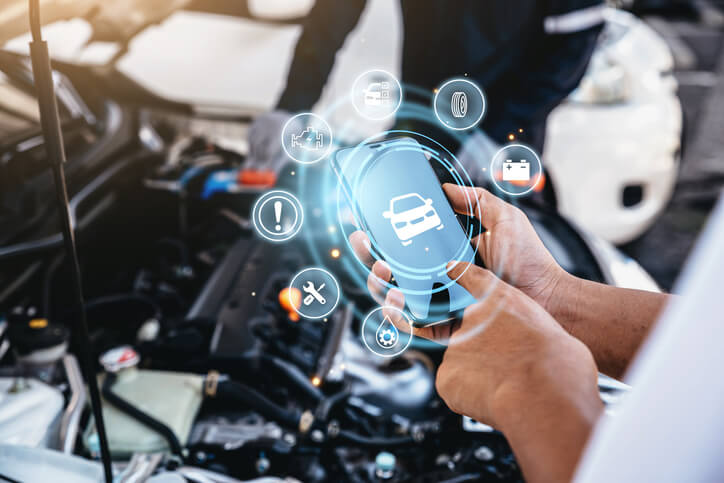The future of driving is here, and it’s smarter than ever. With connected car AI systems at the forefront, the automotive industry is witnessing a technological revolution. These intelligent systems are designed to enhance the driving experience, making it safer, more efficient, and incredibly interconnected.
The rise of connected car AI systems is not just a trend; it’s a significant leap toward smarter transportation. As AI continues to weave its way into the fabric of our daily commutes, understanding its impact and potential becomes essential for anyone interested in the future of driving.

The Evolution of Connected Car Technology
Since the invention of the automobile, innovations have continually driven the industry forward. However, with AI, we’re seeing a transformation. This leap is not merely incremental; it’s fundamental.
AI in the automotive industry has led to significant advancements in vehicle technology, including enhanced safety features, predictive maintenance, and seamless connectivity between vehicles and infrastructure.
Understanding AI in Vehicles
AI is no longer confined to laboratories or large-scale data centers. It’s in our cars, helping us drive with precision and confidence. From adaptive cruise control to autonomous emergency braking, AI systems anticipate and react to road conditions faster and more accurately than ever before.
Through machine learning algorithms, cars learn from vast datasets to improve their responses continuously. The result? Vehicles that not only learn from each trip but also adapt to optimize performance over time.
The Safety Revolution
Connected car AI systems significantly enhance road safety. With AI, vehicles can communicate with each other, anticipate congestion, and react to hazards in real-time. This interconnectedness reduces human error, which remains a primary cause of accidents worldwide.
For instance, AI can predict accidents or alert drivers to potential dangers, ensuring a proactive approach to safety. This preventive capability marks a shift from reactive safety features to predictive and autonomous safety protocols.
Efficiency and Environmental Impact
Artificial intelligence in cars is not only about safety and convenience. It also plays a crucial role in enhancing fuel efficiency and reducing carbon emissions. By optimizing driving patterns and managing vehicle systems better, AI contributes to greener transportation.
Moreover, AI-driven systems can suggest eco-friendly routes and driving habits, positioning themselves as essential tools for environmental sustainability.
Connectivity and User Experience
Today’s drivers expect more from their vehicles than simple transportation. They seek intelligent systems that offer connectivity, entertainment, and a seamless user experience. AI makes this possible.
Through connected car AI systems, drivers can enjoy personalized entertainment tailored to their preferences. These systems provide real-time updates and integration with smartphones and smart home devices, offering a unified digital experience.
Challenges in AI Integration
While the benefits of AI in cars are substantial, integrating these systems poses challenges. Security, data privacy, and the reliability of autonomous functions are critical concerns for manufacturers and regulators alike.
It is essential to ensure that AI systems are secure from cyber threats and that users’ data is protected. As with any technology, there is a learning curve. The industry must navigate these challenges to deliver secure and reliable AI-powered cars.
Future Prospects
The future of connected car AI systems is bright and filled with promise. As these systems evolve, they will become more intuitive, reliable, and essential to the driving experience.
Some emerging trends in the industry include the development of more advanced autonomous driving features, enhanced communication between vehicles and infrastructure, and improved personalization options for users.
For further reading on high-speed automotive advancements, visit this external resource.
Conclusion
Embracing connected car AI systems is not just about chasing the latest technology trends. It’s about redefining mobility, enhancing safety, and making our journeys more enjoyable. As creative professionals and tech enthusiasts, understanding and leveraging these systems will be critical to shaping the future of transportation.
We are on the cusp of a new era in driving. With AI paving the path, the journey promises to be both exciting and transformative.

FAQ Section
How do connected car AI systems improve safety?
AI systems enhance safety by enabling real-time communication between vehicles, predicting potential hazards, and implementing preventive measures to avoid collisions.
What are the environmental benefits of AI in cars?
These systems contribute to environmental sustainability by improving fuel efficiency, reducing emissions, and promoting eco-friendly driving habits.
Are connected car AI systems secure?
While AI systems offer numerous benefits, ensuring their security from cyber threats and protecting user data are ongoing challenges that manufacturers continue to address.
For a deeper exploration of the impact of AI on various sectors, check out AI Tool For Blur and its transformative effects.






